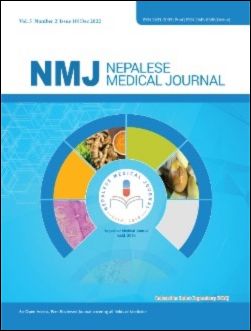Acute Kidney Injury in Patients Using Polyethylene Glycol as Bowel Cleansing Agent for Colonoscopy
DOI:
https://doi.org/10.3126/nmj.v5i2.48954Keywords:
Acute kidney injury; Non-steroidal anti-inflammatory drugs; Polyethylene glycolAbstract
Introduction: The use of polyethylene glycol-based solutions is the gold standard for bowel preparation for colonoscopy. However, polyethylene glycol use might be associated with the risk of acute kidney injury. We aim to find out acute kidney injury and risk factors associated with the development of acute kidney injury in patients using polyethylene glycol for colonoscopy.
Materials and Methods: This was an observational study conducted in the Department of Nephrology and Gastroenterology, Bir hospital. Patients who underwent colonoscopy using polyethylene glycol were included in the study and assessed for acute kidney injury; its incidence, association of risk factors with acute kidney injury, and outcome (complete recovery or no recovery) of acute kidney injury by 3 months.
Results: The mean age of the patients was 45.81 ± 18.60 years with the majority of the patients being male (60%). Out of 48 study participants, 4(8%) develop acute kidney injury. Multivariate regression analysis depicted that chronic kidney disease, chronic liver disease, congestive cardiac failure, and use of non-steroidal anti-inflammatory drugs, angiotensin receptor blockers, and diuretics drugs were the predictors which significantly influenced the occurrence of acute kidney injury in patients using polyethylene glycol.
Conclusions: The evidence strongly suggests that in patients without preexisting renal disease, comorbidities, or use of drugs; the risk of renal impairment is low after colonoscopy using polyethylene glycol as a bowel cleansing agent. In the presence of risk factors for renal dysfunction, polyethylene glycol should be used cautiously.
Downloads
Downloads
Published
How to Cite
Issue
Section
License
Copyright (c) 2022 Gaurav Chhetri, Anil Baral, Rajani Hada, Arun Sedhain, Bikash Khatri, Kashyap Dahal, Albina Piya, Anurag Prasad Singh, Bhupendra Kumar Basnet

This work is licensed under a Creative Commons Attribution 4.0 International License.
This license enables reusers to distribute, remix, adapt, and build upon the material in any medium or format, so long as attribution is given to the creator. The license allows for commercial use.
Copyright on any article published by Nepalese Medical Journal is retained by the author(s).
Authors grant Nepalese Medical Journal a license to publish the article and identify itself as the original publisher.
Authors also grant any third party the right to use the article freely as long as its integrity is maintained and its original authors, citation details and publisher are identified.




